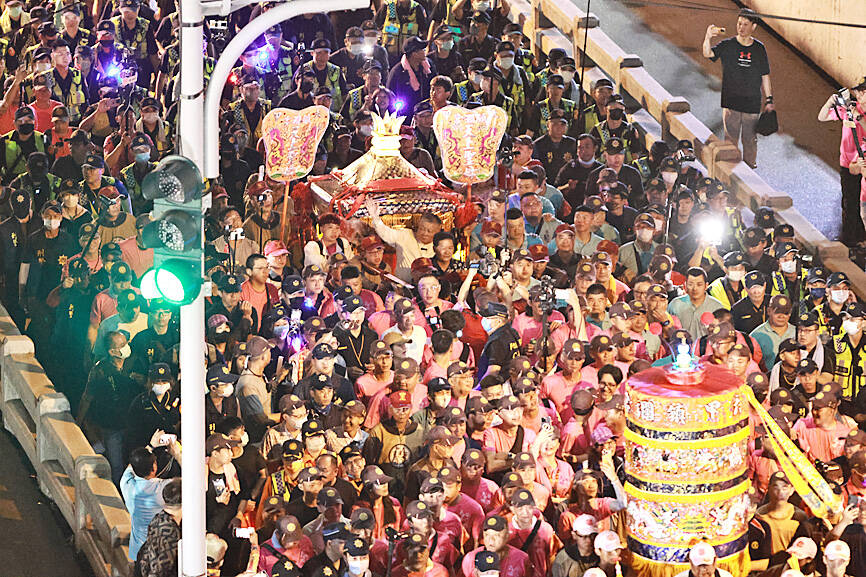The Taichung City Police Department on Friday announced that it would use drones and other technology to enhance public safety and manage crowds during this year’s Dajia Matsu Pilgrimage.
The annual nine-day, 340km procession honors the sea goddess Matsu, whose statuette is enshrined at Jenn Lann Temple (鎮瀾宮) in Taichung’s Dajia District (大甲).
The pilgrimage is set to begin at 11pm on Friday, with devotees traveling through Changhua, Yunlin and Chiayi counties before returning to Jenn Lann Temple on April 13.

Photo: Chen Kuan-bei, Taipei Times
It is one of the most renowned and widely attended annual pilgrimages in central Taiwan, alongside the Baishatun Matsu Pilgrimage in Miaoli County’s Tongsiao Township (通霄).
The Taichung City Police Department said it has arranged additional law enforcement units to protect the main Matsu palanquin, and officers with camcorders would be deployed to help ensure the safe and orderly passage of the procession.
To ensure public safety during the pilgrimage, authorities would implement enhanced protection measures to prevent altercations and violent incidents, target pickpocketing and theft, and deploy officers at major intersections to direct traffic as the procession moves through Taichung, the police department said.
New measures this year include the expanded deployment of officers equipped with camcorders, drones, high-resolution cameras and “M-Police” mobile devices that enable real-time data sharing and online coordination, it said.
All systems would be integrated into a central digital platform managed by a command center for rapid response and oversight, it added.
Violence and group clashes have occurred in previous years, often involving neighborhood religious groups or gang-affiliated factions attempting to forcibly redirect the Matsu palanquin to visit their local temples or altars.
In traditional folk belief, such “close visits” are thought to bring divine blessings and good fortune for the year ahead, fueling intense competition among groups along the route.
Officers have visited local temples and neighborhood groups along the pilgrimage route to conduct inspections, issue safety guidance and assess the need for police deployments, the police department said.
Participants have been warned that displaying gang-related symbols or imagery is strictly prohibited, it said, adding that any involvement in violence or disturbances would lead to prosecution under laws governing public order.
As large crowds — including worshipers from across Taiwan — are expected to line the route, many carrying significant amounts of cash, police have stepped up patrols to deter theft and pickpocketing.
Authorities also advised caution in parking areas, as criminals have been known to smash car windows to steal valuables left inside.
Meanwhile, temple management at Gong Tian Temple (拱天宮) in Tongsiao on Friday night announced that more than 100,000 people have registered to take part in this year’s Baishatun Matsu Pilgrimage.
The procession is scheduled to begin on May 1, traveling from Baishatun Temple (白沙屯宮) to Chaotian Temple (朝天宮) in Yunlin County’s Beigang Township (北港).
Registered participants pay a fee to receive temple-blessed items and accessories, which also identify them as official pilgrims and grant them priority arrangements during the event.
However, temple officials said that anyone is welcome to join and walk along the route regardless of registration.

The Ministry of Economic Affairs has fined Taobao NT$1.2 million (US$36,912) for advertisements that exceed its approved business scope, requiring the Chinese e-commerce platform to make corrections in the first half of this year or its license may be revoked. Lawmakers have called for stricter enforcement of Chinese e-commerce platforms and measures to prevent China from laundering its goods through Taiwan in response to US President Donald Trump’s heavy tariffs on China. The Legislative Yuan’s Finance Committee met today to discuss policies to prevent China from dumping goods in Taiwan, inviting government agencies to report. Democratic Progressive Party Legislator Kuo Kuo-wen (郭國文) said

The Ministry of Economic Affairs has fined Taobao NT$1.2 million (US$36,900) for advertisements that exceeded its approved business scope and ordered the Chinese e-commerce platform to make corrections in the first half of this year or its license would be revoked. Lawmakers have called for stricter supervision of Chinese e-commerce platforms and more stringent measures to prevent China from laundering its goods through Taiwan as US President Donald Trump’s administration cracks down on origin laundering. The legislature’s Finance Committee yesterday met to discuss policies to prevent China from dumping goods in Taiwan, inviting government agencies to report on the matter. Democratic Progressive Party

Taiwan and its Pacific ally Tuvalu on Tuesday signed two accords aimed at facilitating bilateral cooperation on labor affairs, according to Taiwan’s Ministry of Foreign Affairs (MOFA). The governments inked two agreements in Taipei, witnessed by Foreign Minister Lin Chia-lung (林佳龍) and visiting Deputy Tuvaluan Prime Minister Panapasi Nelesone, MOFA said in a news release. According to MOFA, the agreements will facilitate cooperation on labor issues and allow the two sides to mutually recognize seafarers’ certificates and related training. Taiwan would also continue to collaborate with Tuvalu across various fields to promote economic prosperity as well as the well-being of their

Sung Chien-liang (宋建樑), who led efforts to recall Democratic Progressive Party (DPP) Legislator Lee Kun-cheng (李坤城), was released on bail of NT$80,000 today amid outcry over his decision to wear a Nazi armband to questioning the night before. Sung arrived at the New Taipei District Prosecutors’ Office for questioning in a recall petition forgery case last night wearing a red armband bearing a swastika, carrying a copy of Adolf Hitler’s Mein Kampf and giving a Nazi salute. Sung left the building at 1:15am without the armband and covering the book with his coat. Lee said today that this is a serious